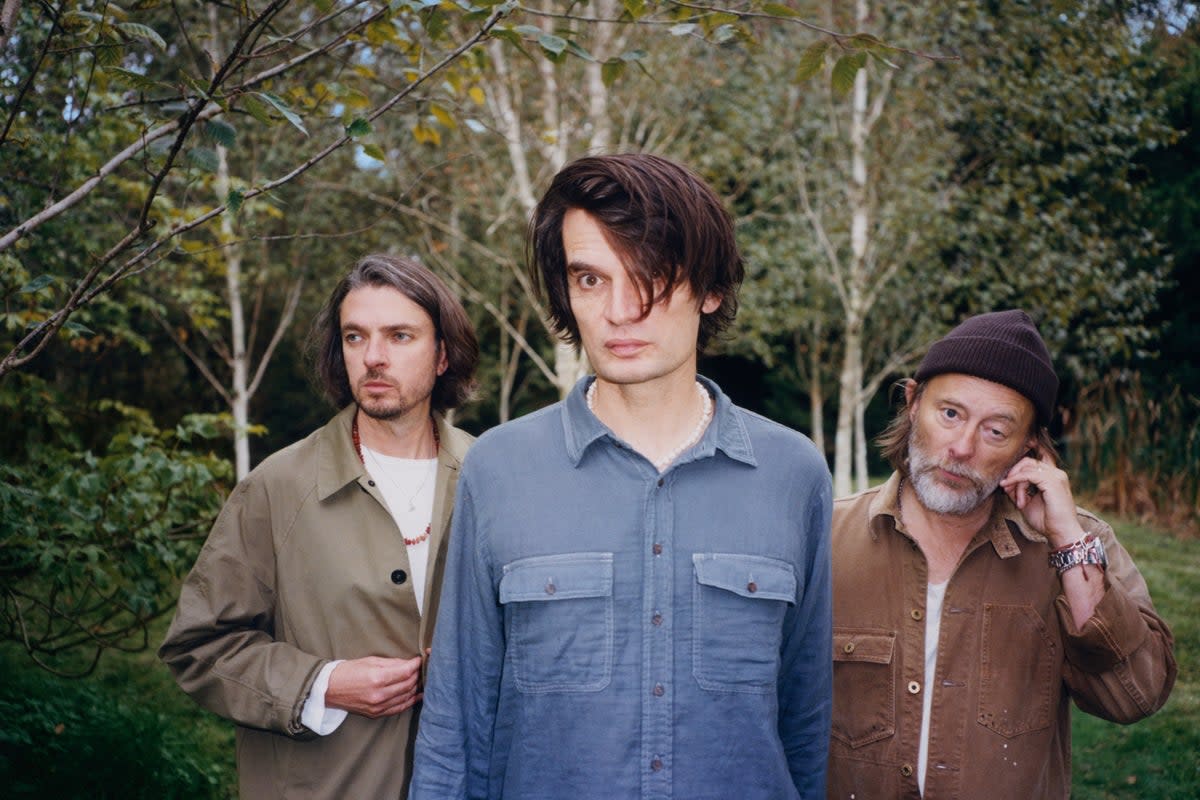The Smile, Wall of Eyes review: An enthralling evolution of Radiohead’s original oddities

“Fast and fluid” is how Thom Yorke describes songwriting with The Smile. The trio – comprising fellow Radioheader Jonny Greenwood and jazz drummer Tom Skinner – emerged from Covid as an apparent side project, but their 2022 debut, A Light for Attracting Attention, proved they were onto a winner as it skittered to Number 5 in the UK album charts. With Greenwood more at home crafting movie soundtracks lately than he is slugging out stadium rock, The Smile is becoming the musicians’ main event and the band’s second album, Wall of Eyes, finds them relishing their knotty new groove.
The album opens, rather deceptively, with the shuffling mellow bossa nova strum of the title track, cushioned by the felted patter of Skinner’s bass drum and Yorke’s near intelligible croon. But don’t be fooled. This isn’t a Radiohead album for coffee shops: Yorke is still the same angsty, paranoid lyricist, and Greenwood, still the same sonic experimentalist. Skinner is more than happy to aid and abet the pair with a series of twitchy odd-time signatures. It’s got all the weird, unsettled emotion and melodic heft of Radiohead, only explored in a safe space with some beanbags and a lava lamp.
Once you’re sitting comfortably, the mood of “Wall of Eyes” slowly darkens. Yorke warns “strap yourself in” and Hitchcock strings crank up the tension until Greenwood’s guitar and some wonky electronics send the tune staggering into discord. Yorke’s slippery lyrics urge us to “raise our glasses/ To what we don’t deserve”. Then we’re sinking into the murky electronics of “Teleharmonic”, which has a terrific looping swirl to it. Skinner’s sticks tap out pretty, flickery pulses, like a fish’s fins catching the light in the deep, as Yorke siren sings of “payback” and “dragnets”.
“Read the Room” is rockier with a Beatles-esque melody that slips from lullaby to menace in the vein of “Karma Police”. Yorke backs us into a corner with reminders of “candy aerosols”, “crashing currency” and “massive egos/ so big they bend the light”. The political recriminations continue on the jazzy, piano-backed “Friend of a Friend”, which seems to be sung from the point of view of a post-Covid politician casually wondering: “All of that money, where did it go? where did it go?/ In somebody’s pocket?/ A friend of a friend.”
“Under Our Pillows” opens with a great, glitchy riff and drifts all over the place like spooky space dust. There’s a little echo of The Doors in its driving, doom-smitten, funeral home keyboard vibe. Skinner’s high-hat splashes away towards the end like rain on the windscreen in the Sixties band’s “Riders on the Storm”. It’s one for all the proggys out there – which is to say, it’s unlikely to make the Radio 2 drive time slot. “I Quit” is another little zero-gravity weirdo of a track.
“Bending Hectic” – about a suicidal car crash – has received a lot of advance praise. It’s got cool imagery, and an Ennio Morricone breeze in its simple hook. You can see the “Sixties soft top, skidding round the hairpin/ The sheer drop down the Italian mountainside”, but I’m not totally sold on the rock-out melodrama of the crash, which has the feel of a sixth form workshop about it. I’m sure, though, that it was fun to make those guitars go squeal-spinning through the air like plunging tyres.
The album floats more gently to a close with the muffled piano and distant Clanger sounds of “You Know Me”. Interviewed in Jason Thomas Gordon’s new book, The Singers Talk, Yorke spoke about his early fear of expressing genuine vulnerability with his vocals, preferring instead to hide behind layers of allusion. Yorke said the first time he really sang as himself was on 1995’s “Fake Plastic Trees”. When he heard the track back, he cried and asked Radiohead not to use it because it’s “too much me”. He reaches for that vulnerability with heartrending ease at the end here, even as he alerts us to the evasions. “Don’t think you know me,” he swoons in his sweetest falsetto. “Don’t think I’m everything you say.” It’s wonderful to find so many moreish layers in music that was, apparently, composed so quickly. Grab yourself a bean bag and settle in for the long haul with this one.


